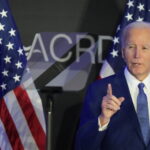Help Wanted. Looking for US researchers.
As President Trump cuts billions of federal dollars from the institutes and scientific universities, he restricts what can be studied and expels immigrants, rival nations hope to collect the talent that has been chosen or that becomes and dusk.
For decades, trying to compete with US institutions and companies has been difficult. The United States was a magnet for the main researchers, scientists and academics. In general, the budgets were larger, the payment was larger, the laboratories and the equipment were larger. They were also ambitions.
In 2024, the United States spent almost $ 1 billion, approximately 3.5 percent of total economic production, in research and development. When it comes to the son of long -term basic research that supports US technological and scientific advances, the government represented about 40 percent of the expense.
That is why political, education and companies in advanced countries and emerging economies have been very concerned about a brain leakage of their own coasts. Now they are taking the opportunity to reverse the flow.
“This is an opportunity to make brain profits once in the century,” said the Institute of Strategic Policy of Australia, since he encouraged his government to act.
Last week, at more than the members of the boxes, the European Union announced that it would spend an addition to 500 million euros, or $ 556 million, in the next two years to “make Europe a magnet for investigators.”
Such sum is insignificant compared to US budgets. Therefore, it is understandable if your appeals are with a request to “show me money.”
After all, wages tend to be much lower in Europe. In France, for example, a 35 -year -old researcher can expect to win around € 3,600 (around $ 4,000) per month before taxes, according to the French Ministry of Education and Research. A postdoctoral fellow in Stanford could win the equivalent of about € 6,000 (around $ 6,685) for months in the United States.
Still, there is interest. Or 1,600 people who responded to a March survey in Nature magazine, many of them Ph.D. O Postdoctoral students in the United States: three out of four said they were considering leaving the country due to Trump administration policies.
And the most generous social security network in Europe can compensate for a large part of the salary differential, said Patrick Lemaire, president of the Sociétés College, Savantes, Acadeiques de France, an arm of an international council that refers in France.
“There is much less money in Europe, and wages are much lower,” he said. “But you also have very good social security and medical care, which is free; school and university registration is free.”
These are some of the launches sacrificed by the country and universities around the world.
France
In addition to the European Union, France promised to put effective on the table last week. President Emmanuel Macron said his government would spend $ 113 million on a program to attract US researchers.
Other academic institutes are putting their own money. Aix Marseille University said it would spend up to $ 16.8 million to finance 15 foreign researchers. The sacrifice has so far attracted more than 50 applicants, according to Science magazine. The University of Paris Saclay is also establishing five new positions for US researchers.
Spain
Diana Morant, the Minister of Sciences, Innovation and Universities in Spain, said that the Government was budgeting additional 45 million to attract “despised or underestimated scientists by the Trump administration.” The program offers US researchers an additional subsidy of $ 200,000 in addition to a package of one million dollars that is normally offered.
Catalonia, the prosperous region of the Northeast of Spain, announced a $ 34 million program to attract US researchers who “can see their restricted academic freedom.” Twelve universities will help sponsor 78 “high quality” scientists in total from the United States over the next three years.
Pine
Established in “Born in the USA” by Bruce Springsteen, an Instagram post by Brian Mikkelsen, executive director of the Danish Chamber of Commerce, made this appeal: “This is a direct invitation to US researchers.” Talented people are losing their jobs or funds because politics is eclipsing science, he said. “We want you to know that there is an alternative. In Denmark, we value science. We believe in facts.” He said that the Chamber and the Society of Engineers were asking to accelerate 200 positions for researchers about the next three years. No funds were mentioned.
Sweden
Johan Pehrson, Minister of Education of Sweden, organized a meeting last month with officials from nine universities to discuss how to attract discontent talent. “For American academics and scientists: we need you!” He wrote in X. Alas, there was no musical accompaniment or money mentioned.
Norway
“Academic freedom is under pressure in the United States,” said Jonas Gahr Store, Norway Prime Minister. The Government offers 100 million Kroner, or $ 9.6 million, to finance US and other international investigators next year.
Great Britain
According to reports, the Labor Party government plans to spend 50 million pounds, or $ 66 million, to finance and relocate international scientists.
Canada
The University Health Network in Toronto and other foundations dedicate 30 million Canadian dollars ($ 21.5 million) to recruit 100 young scientists from the United States and elsewhere. In April, the British Columbia University began the “Week of the applicant of the United States” and reopened applications for some postgraduate programs to give American students another opportunity to run.
Portugal
Citing the Trump administration policies, the Nova School of Medicine in Portugal announced that it would budget additional $ 2 million to cover the salaries of the “international researchers of excellence” for three years and some relocation costs.
Austria
“The destruction of the freedom of science and democracy in the United States leaves me speechless,” said Eva-Maria Holzleitner, minister of women, science and research, in an Instagram video. “We are working on programs to provide a safe port for students and scientists at risk.”
Last month, Austria opened its own National Portal on Euraxess – in motion researchers, a platform backed by 43 European nations, a wide database of work offers, scholarships and subsidies, as well as information on the organization of a research project in Europe.
Australia
The Australian Academy of Sciences begged a search for global talent last month, and its president said there was “urgent and incomparable opportunity to attract the intelligent minds that the United States abandons.” The call requested donations to finance the effort.
Ireland, Belgium, South Korea and China have also talked about the initial programs aimed at researchers, scientists and students in the United States.
Liz Alderman Paris contributed reports.









